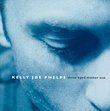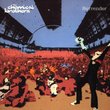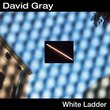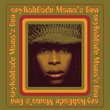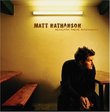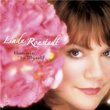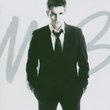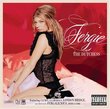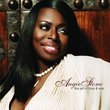| All Artists: Brad Mehldau Title: Art of Trio 2: Live at the Village Vanguard Members Wishing: 2 Total Copies: 0 Label: Warner Bros / Wea Original Release Date: 3/10/1998 Release Date: 3/10/1998 Album Type: Live Genres: Jazz, Pop Styles: Modern Postbebop, Bebop Number of Discs: 1 SwapaCD Credits: 1 UPCs: 093624684824, 603497093465 |
Search - Brad Mehldau :: Art of Trio 2: Live at the Village Vanguard
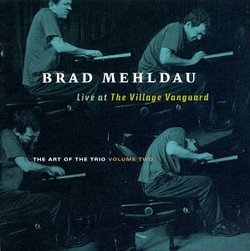 | Brad Mehldau Art of Trio 2: Live at the Village Vanguard Genres: Jazz, Pop
This live set, recorded at New York's Village Vanguard in the summer of 1997, presents pianist Brad Mehldau with bassist Larry Grenadier and drummer Jorge Rossy, the same personnel as on The Art of the Trio, Volume One. Th... more » |
Larger Image |
CD DetailsSynopsis
Amazon.com This live set, recorded at New York's Village Vanguard in the summer of 1997, presents pianist Brad Mehldau with bassist Larry Grenadier and drummer Jorge Rossy, the same personnel as on The Art of the Trio, Volume One. This is hardcore jazz, with tunes by Cole Porter, Thelonious Monk, Jerome Kern, Henry Mancini and Johnny Mercer, and John Coltrane. Mehldau hasn't yet earned a place in the highest rank of the jazz pantheon, but if he keeps making recordings of this caliber, he'll blow away a lot of the opposition. He doesn't wear his influences on his sleeve but, with the support of Grenadier and Rossy, executes harmonic reconstructions of standard texts. --Stanley Booth Similarly Requested CDs
|
CD ReviewsToday's Most Challenging and Refreshing Jazz Trio. Edy Gibert | Buenos Aires, Argentina | 11/19/2001 (5 out of 5 stars) "This album is the 2nd volume of the trio's production entitled: "The Art Of the Trio". It is also the first of the live recordings of the pianist Brad Mehldau with his partners Larry Grenadier (bass) and Jorge Rosy (drums) at the Village Vanguard in NYC, this time during a summer appearance in 1997. The album is definitely a highlight of the Trio's material and it brings Mehldau's outstanding musical virtues as a pianist directly into the audience. One of the best way to evaluate the musician is live, in direct with no studio cosmetics or second chances. Mehladau not only passes the test -or any test you wish to give him- but also exceeds any expectations you may have weather you are a Bill Evans, Keith Jarrett or Corea follower. Critics impose a heavy stigma on Mehldau when they compare him to Bill Evans and claim that he is the next successor to the throne. I never buy or reject any artist's music because of his influences, similarities, or differences, but rather on his own capabilities. Within the piano jazz trio format, Mehldau is extremely creative, very sharp, takes risks, very moving, a virtuoso when it comes o technique, and takes jazz into music boundaries where very few artists can go. Without getting into the similarities or differences with the other piano masters, having heard all of the Evans, Jarrett, Corea, and Hancock albums I recommend you that if you appreciate free format jazz piano trios, include this CD in your collection. It will either be one of your best and favorites ones throughout time of the most challenging one if you are an extremely conservative listener. I celebrate that modern jazz has a young pianist with such talent and capacity. The repertoire is composed of six "covers" and does not including any of Mehldau compositions -as he did in the Trios Vol IV: Back at the Village Vanguard-. During the CD's one hour twenty minutes, the tunes range from "Monk's Dream" (T. Monk) and "Countdown" (J. Coltrane) to classic standards like "Moon River" (Mercer-Mancini) or "It's Alright with Me" (C. Porter) allowing Mehldau to expand his creativity to the max. Lastly, try not to get to involved with Mehldaus' very extensive comments and reflections that appear in the inside of the CD's cover, like some reviewers who have rejected and criticized Mehldau's thoughts as if the item offered were a book instead of a jazz piano CD. Believe me, Mehldau's language is the piano and his thoughts make a lot of sense when he plays "his jazz" into our souls. Keep speaking Mr. Mehldau, your playing came just in time as jazz piano was getting monotonous." Major, major jazz George Grella | Brooklyn | 09/18/2001 (5 out of 5 stars) "It's easy to evaluate a jazz musician's career in retrospect, usually when they're in middle age, and declaring greatness over a large body of work and years of concerts. It's never so easy when faced with a still growing body of work from a contemporary artist. Bard Mehldau is one such artist, and even though he has made fewer than 10 discs, one can say without hesitation that he is a great jazz musician. The proof is in the playing, and this CD is one of many great doorways into that playing.As a pianist, Mehldau is a virtuoso, secure in both hands and with an effortless variety of articulations at any speed. But he's no Oscar Peterson, he has plenty to say. Plenty.To his own frustrated bemusement, Mehldau has often been compared to Bill Evans [even among the professional editorials on Amazon] yet that is a shallow case of racial-profiling. Other than being a white piano player, there are no real similarities. Mehldau is lyrical and introspective in the Evansian sense only in the manner with which jazz musicians call ideas from out of themselves. He has a fire that Evans never envinced and a style that is unique and refreshing. Like a lot of modern jazz artists, he has gone to the classical repertoire to expand his harmonic range and his improvisational sense, but where for most jazz players, the classical touchstones are Stravinsky, Bartok and Debussy, Mehldau has turned back to the 19th century, especially the piano music of Robert Schumann. So instead of expanding jazz harmonics by extending tonalities, he uses the more subtle but richer approach of placing simpler chords in an overall harmonic structure that is more complex; basic inversions that give a sense of false cadence, diatonic harmonies over extended pedals to create ambigiuous key relationships, etc. These are all composers' concerns, and that is what Mehldau often does, his improvisations are re-compositions. He frequently takes apart the structure of a tune, examining it from many angles, and does so with tremendous vitality and swing. The approach is more like Sonny Rollins, with the advantage of the harmonies a piano provides. And it's tremendously gripping and exciting, rich in detail and imagination. There is the sense in listening to him that you are discovering what he is right along with him.Also unlike Bill Evans, this is definitely a soloist-accompanist trio, not a collective. Grenadier and Rossy could not be more solid or sympathetic with the leaders approach, and they are vital in maintaining the ideas and energy. Pervious criticism is cloth-eared and unwarranted. Mehldau is fast becoming an essential part of the music, don't let him get away without you." Notes on a controversy ADB | Colorado Springs, CO United States | 01/17/2005 (4 out of 5 stars) "Sorry, this isn't really a review of this album. It's a few thoughts on the "controversy" over comparing Mehldau to Bill Evans (see, e.g., the "Major, major jazz" review on this page). Mehldau himself has disavowed the comparison on several occasions, most notably in the liner notes to Art of the Trio Vol. 4, in which he says he only listened to Evans "a little, when I was 13 or 14 years old"--and then goes on to provide a detailed analysis of how his trio functions in a different way than Evans's. If you take this at face value . . . (After I read Mehldau's liner notes, I was hoping someone would get him a copy of Harold Bloom's _The Anxiety of Influence_ for his birthday.)
Some of Mehldau's points (e.g., racial troping and the role of the bassist) are repeated in a well-written review on this page. I'd like to respond to a few of those points--because methinks it has gotten to the point where Mehldau (and some of his fans) doth protest too much. Let me grant three points immediately: 1) Mehldau is a unique and gigantic talent. His personal expression is not in any way invalidated by similarities or differences with Bill Evans or any other pianist. 2) Harmonically, Mehldau is not an impressionist the way Evans was. 3) Collective improvisation is not the key to the Mehldau Trio as it was to Evans's best trios. But! The comparisons to Evans did not come out of the blue, and racial troping (or "profiling") seems to me something of a red herring. I mean, if it were that simple, why isn't Mehldau also frequently compared with George Shearing, Dave Brubeck, Vince Guaraldi, and Chick Corea? Beyond the obvious facts of performing in a trio and playing in a Romantic, introspective manner, Mehldau is frequently compared to Evans, I believe, mainly because of his choice of repertoire. On his very first album, for instance, Mehldau recorded two Richard Rodgers classics--"It Might as Well Be Spring" and "My Romance"--that had long been associated with Evans. In fact, Evans recorded "My Romance" many times, starting with *his* first album. And on this album (AotT2), Mehldau plays "Young and Foolish," which Evans recorded several times. Beyond such specific examples, there is a general similarity in what they play, a mix of high-quality standards (Rodgers, Porter, Gershwin, etc.), originals, and unexpected works by contemporaries. That might sound generic enough to be true of nearly any jazz performer--but if you look carefully at what Mehldau plays, you will see it resembles the things Evans recorded much more than it resembles what most other jazz performers, pianists or otherwise, play. Keep in mind, too, that using the "great American songbook" as the basis for major league jazz improvisations (and writing pieces in a similar vein) was quite unusual and not exactly fashionable during Evans's peak years, which coincided with the free jazz and fusion movements. It's less unusual now, after the Keith Jarrett and Wynton Marsalis standards collections, but there is no question that Evans is an important link between pre-bop and contemporary performance of standards material. Mehldau and Evans also resemble each other in the things they play that are off the beaten path (for the jazz world). Mehldau has covered material by such elder statesmen of the rock establishment as Paul McCartney and Paul Simon--which is still a little unusual for a jazz performer. But the Paul Simon song he recently covered, "Still Crazy After All These Years," comes from the same album that the Simon song Evans liked to cover ("I Do It for Your Love") does. Also, Mehldau has gotten a lot of attention for covering tunes by Nick Drake and Radiohead--just as Evans received attention for covering Johnny Mandel's Theme from M*A*S*H and songs by Burt Bacharach (before he was considered one of the "old masters"). In both cases, they saw the lyrical value of material that others wouldn't might not have thought to convert into jazz. So the claim that there are "no similarities" between Evans and Mehldau just doesn't ring true. In addition to their similar choice of repertoire--which suggests a great amount of temperamental affinity if not necessarily direct influence--both are classically trained pianists, and you can easily hear that (although I don't think Mehldau's touch is quite as refined as Evans's was). Also, the claim that Mehldau has "a fire that Evans never envinced [sic]" doesn't wash with me. Miles Davis said he hired Evans specifically because he wanted Evans's "quiet fire." And that fire wasn't always all that quiet, as anyone who has heard Evans's early recordings with George Russell (e.g., "Concerto for Billy the Kid" and "All About Rosie") well knows. Evans was perfectly capable of barnstorming when he wanted to. This was a man who played Beethoven's Third Concerto at his senior recital and who liked to play Rachmaninoff's Third Concerto for his own private enjoyment. If you think you can play those virtuoso masterpieces without fire in your belly, guess again. Okay, those are my points. I just think the pendulum has tended to swing too much from uncritical comparisons to (blindly following Mehldau's own not disinterested lead) uncritical disavowals of all affinities. Hey, it's a massive compliment to be compared to Evans. And it shouldn't mean that Mehldau isn't his own man, because he most definitely is. It's just that given what he's playing (esp. in a jazz piano trio format), Evans is the obvious point of reference and will remain so, just as Verdi would be an obvious point of comparison for Puccini. Sure, let's be aware of the crucial differences between them. Let's look for and celebrate everything that's distinctive in Mehldau's playing (because there's plenty of that). But when we look through the musical universe, to whom are we likely to compare Mehldau? Verdi? Madonna? Bill Monroe? Stuff Smith? No one picked Evans's name out of a hat. P.S. If you love piano jazz, get all of Mehldau's albums, including this one (well, maybe except Largo). You see, he's this great contemporary jazz pianist, a little like Bill Evans, only different . . . " |

 Track Listings (6) - Disc #1
Track Listings (6) - Disc #1